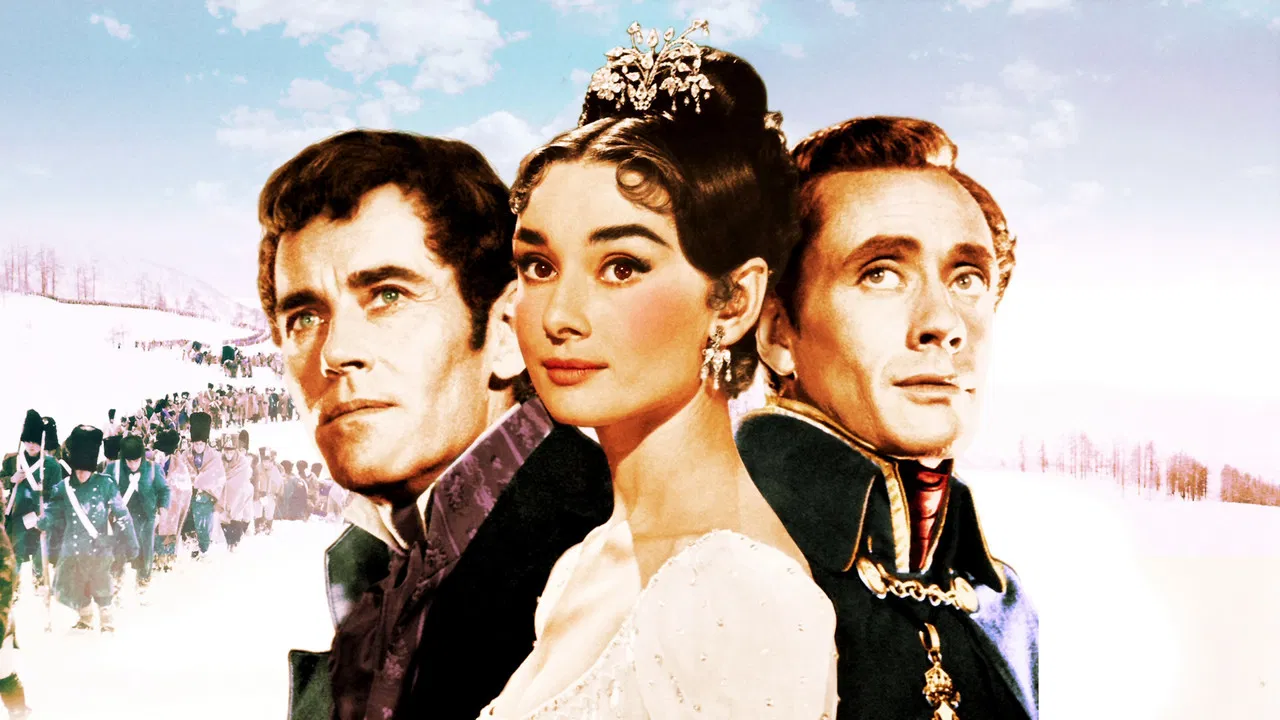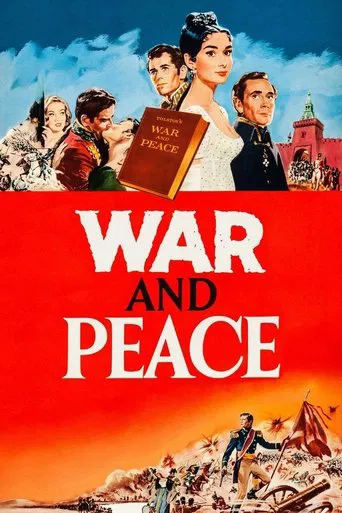

There have been a number of film versions of "War and Peace", including Sergey Bondarchuk's monumental 1966 Russian one, but this version has something none of the others have - Audrey Hepburn.I feel they all suffer in comparison just because of that. Even old Sergey may have wished he could swap 20 thousand or so extras just to have had someone comparable in his movie.Although as a 10-year old back in the 50's, I probably thought there was far too much peace in the war to peace ratio, this film caught my imagination and I never forgot it, which is more than I can say for hundreds of movies I saw in the 80's and 90's.I have seen it a number of times since, and I still think it has size and style. It has something to say about people caught up in momentous events, and the human drama is not overshadowed by the spectacle.Audrey was born to play Natasha Rostova, nobody could swish a ball gown quite like her, and she was never more perfectly cast, despite the film copping plenty of flack from the critics.Henry Fonda as Pierre? I think this is an honest portrayal and a tough part to make work. His Mid-western accent seems a little incongruous at first, but at least he didn't try a Russian accent along the lines of Boris from "The Rocky and Bullwinkle Show"As for Mel Ferrer, critics thought his unemotional, one-dimensional delivery almost killed the film, and it is a hard one to defend. He was a very buttoned-up dude at best, but I liked a couple of his scenes and especially his speech to Pierre before the battle (everyone gets a speech or two in the film). He also dies one of the most beautiful screen deaths later on, by candlelight.The film has spectacle even when compared to Bondarchuk's opus. Director, King Vidor could handle action. I remember reading somewhere that although he did have hundreds of extras to deploy, they were easily swallowed up in open countryside, so he set his depiction of the battle of Borodino in a valley, which compressed the action. The scenes of the French retreat from Moscow in the snow are also impressive.I love the film's distinctive, Tchaikovsky flavoured score by Nino Rota. This was the era when music was composed specifically for a film - before temp tracking tended to make many movie scores sound the same.I have always thought this a very complete movie. Forget the severe criticism, and just go with Audrey Hepburn at her most beautiful, and more than a few moments of inspired filmmaking.
... View MoreAs with most literary adaptations, it is fundamentally pointless to speculate on the extent to which King Vidor's memorable movie either departs from or reproduces the themes and style of Tolstoy's source- text. Film and literature are fundamentally different media and should be treated as such.What is perhaps more suggestive is to look at this version of WAR AND PEACE in its context of production. Napoleon (Herbert Lom) has the desire to invade Russia and hence expand the scope and range of the French Empire, just like Hitler had imagined fifteen years before the film's release. Initial success was followed by ultimate failure, as the Russians, spearheaded in the film by Field Marshal Kutzorov (Oscar Homolka), fight a war of attrition, eschewing direct combat in favor of occasional guerrilla raids. Napoleon cannot understand his opponents' behavior: no one will come to sign an official surrender. Eventually he is forced to withdraw, and his troops have to complete a 3000+ kilometer journey out of Russia while enduring the exigencies of winter. With little or no capacity for resistance, they are easily overrun by Dolokhov (Helmut Dantine) and his forces. Vidor's film offers a powerful denunciation of dictators, who are often so crazed with ambition that they have little or no concern either for military logistics or for the welfare of their forces. Napoloeon, like Hitler, gets what he deserves.Yet WAR AND PEACE is equally critical of the Russian side. Natasha Rostova (Audrey Hepburn) inhabits a bourgeois society where outward show matters: as in many latter-day Austen adaptations, most members of her class spend their time trying to see and be seen at balls. Vidor includes several dance-sequences that might be pretty to look at, but suggest the trivialities of the Russian world; even though the French army are drawing nearer and nearer, no one seems to be taking any notice. Eventually her lover Prince Andrei Bolkonsky (Mel Ferrer) is sent away to the front and discovers the realities of life. Natasha has a brief fling with another man, but comes to discover the realities of life when she and her family are forced to evacuate Moscow to avoid being annihilated.The film contains some spectacular battle-sequences, no more so when the French and Russian forces meet, and Pierre Bezukhov (Henry Fonda) tours the Russian battle-lines and discovers to his cost just how hellish the world of combat can be. Having been taken prisoner by the French, he is marched back to France with the departing forces, where he meets a fellow-prisoner Platon Karataev (John Mills) and discovers a way to survive even in a world seemingly crashing to destruction around him.WAR AND PEACE contains a happy ending of sorts, as Pierre and Natasha reunite after several years apart, but the scene of utter destruction facing them makes it a Pyrrhic happiness. The only way they can survive - as the film reminds us in a title-card taken from Tolstoy's novel - is to love life itself, and accept all that it can throw at us with equanimity. This might have seemed a rather optimistic message during the mid-Fifties, at a time when US-Soviet relations were lukewarm, to say the least, but it still holds sway today.Vidor's film is extremely long, but sustains our attention throughout. Definitely worth watching if time and attention permit.
... View MoreI only wish that the novel could hold a flame to this visual masterpiece. The Novel is too heavy. It broke one of my bookshelves. The book cost me like 40 dollars for a collector's edition. This film was free on pretty much any site that I had a membership for; therefore, I didn't even blow a cent for my viewing enjoyment. I could go to the fridge and get a tasty beverage, while still listening to the movie without having to pause it. I tried to bring the novel with me while I was reading, to get a delicious beverage, but ended up in traction. I only had to set aside an evening to watch this film. I had to set aside my vacation time to read the novel. But, you know how the saying goes "A novel is never as good as the movie."
... View MoreAny allusion to Tolstoy's masterpiece in connection with this film can only be considered libel. The film fails on virtually every level and bears no thematic, emotional, intellectual or philosophical relationship to that great novel. With so many flaws, all that remains is a perfectly ridiculous farce. But it is pretty.One can gain a cursory introduction to Tolstoy's novel from this film, but little else. Tolstoy envisioned a colossal and sweeping epic of cultural upheaval amidst an intricate tapestry of human drama set against the French invasion of Russia by Napoleon. King Vidor seems to have in mind something a little more akin to a saccharin, tawdry melodrama with great costumes.The casting decisions are completely incomprehensible. Although I adore Audrey Hepburn and, when properly cast, she was beyond compare, as the complex and conflicted Natasha Rostova her strengths become weaknesses. As the sprightly ingénue, or the naïve gamin, she set the screen on fire. Moreover, as she was, in fact, an aristocrat, her regal bearing is sublime.There are, however, qualities in the great characters of Russian literature that were simply not within Hepburn's repertoire. Her memorable turn as Holly Golightly may have transformed Capote's layered character into a shallow, though thoroughly delightful, scatterbrain, but her incomparable radiance made it all worthwhile. Sadly, a similarly simplified Natasha did not play as well.Hepburn's then husband, Mel Ferrer, was equally miscast as the vain and sardonic Prince Andrei. To be fair, he would have been miscast in any serious role, as he was a positively dreadful actor, but like most of the cast, he fails to reflect any of the impact that war can have on people's lives or the epic cultural shifts that were taking place in Russia at the time.Neither of these sins can hold a candle, however, to the casting of Henry Fonda as Pierre Bezukhov. First, he was, by his own acknowledgment, far too long in the tooth for the role, which he says he merely took for the money. More to the point, his bumpkin blank stares and cloying American earnestness, and a ubiquitous curiously pained expression that defies explanation, his stock in trade in more successful efforts, smother any subtlety that the role requires. Wandering through epic battles like a cow grazing mindlessly in a football field, he could not be more ridiculous. Granted Pierre's application of gematria to determine that Napoleon was the Biblical Antichrist may have been a bit much to put on the big screen in 1956, but are we truly to accept Fonda's placid counting to one thousand to keep his feet from freezing as a reasonable substitute? I suppose that had the film been called "Pretty French and Russian Uniforms" it would have been less objectionable and certainly more honest, but then who would have watched it? As "War and Peace" it is more epic failure than truly epic.In one scene Fonda as Pierre stands inexplicably on a great battlefield and mutters, "Damn you Napoleon. Damn you to hell." He should have directed this curse at King Vidor, the true villain of the piece, for squandering the legitimate talents of Audrey Hepburn, Henry Fonda and, one must not forget, Leo Tolstoy on this travesty. Damn you King Vidor. Damn you to hell.
... View More